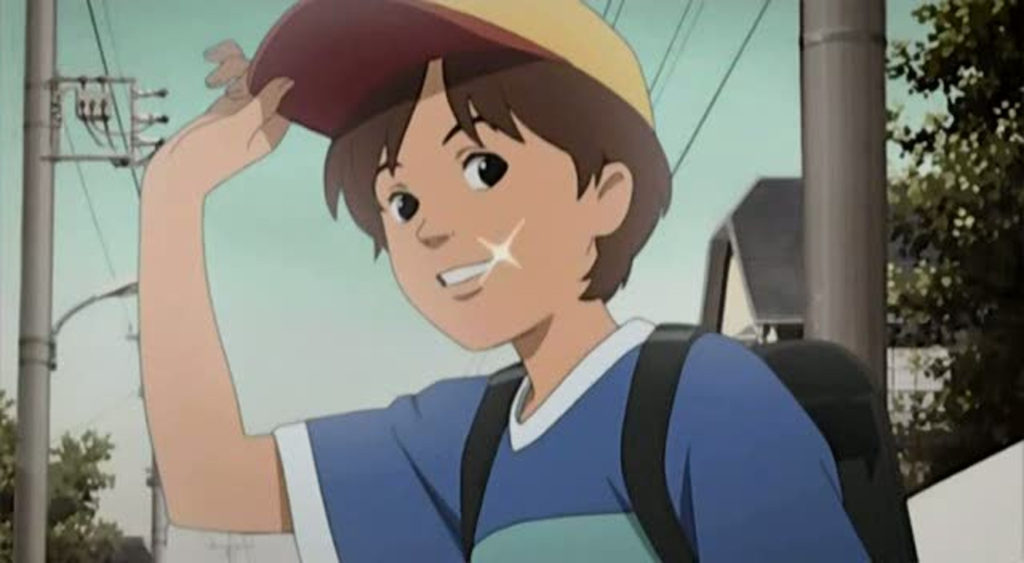The second episode of Paranoia Agent shifts gears entirely, both in terms of the story’s focus and the structure (it’s easy to suspect that this is going to be the case fairly consistently). In the aftermath of the mysterious Lil’ Slugger’s second attack, on venal, froglike paparazzo Kawazu, Tokyo is buzzing with questions about the spate of beatings, but none of that particularly matters to Taira Yuichi (Yamaguchi Mayumi), the most popular boy in his sixth-grade class. Nicknamed “Ichi” (something like “No. 1”) because he’s so damn good at everything, the boy becomes the target of great suspicion when more and more details come out about Lil’ Slugger, and all of it matches up to Ichi – particularly the unlikely fact that they both have golden roller blades. Suddenly the subject of ridicule for the first time ever, his fragile ego can’t take it, and he makes the quiet, pudgy new student Ushiyama Shogo (Tsumura Makoto) his scapegoat, assuming that it’s all an elaborate plot to win Ushiyama the class council spot that Ichi thought himself destined for.
Where “Enter Lil’ Slugger” was a fairly straight-up whodunnit, “The Golden Shoes” plunges us into the mind of a fragmenting personality, the first time that the “paranoia” part of Paranoia Agent makes itself known. Almost the whole story is told in Ichi’s voiceover, moving from the bold confidence of the early scenes, when he’s at the top of his game, to sheer desperation at the end, when he’s lost seemingly everything. Ostensibly a story of how Lil’ Slugger is affecting people all over Tokyo, “The Golden Shoes” is much more a merciless plumbing of egocentrism. At first, Ichi seems like a nice enough guy, but even before he starts to lose his grip on reality, we’ve seen through him: he’s arrogant and smug and entitled, given to self-aggrandizing fantasies that present him in all manner of flattering surroundings (the deliberately limited and repetitive animation does a good job of emphasising the particular hollowness of Ichi’s imagination).
Of course, it’s also a mystery story, and if “The Golden Shoes” doesn’t give us any more real hints about who or what is Lil’ Slugger, it offers tantalising hints of what’s going on in the world that’s being revealed so slowly. First, it was only now clear to me that the old man’s curious vision at the end of “Enter Lil’ Slugger” was actually a weird, poetic way of giving us the preview for the next episode, but the choice of couching it in the form of a character within the show has to be telling: we can already see that he’s some kind of seer, given that he’s added to his massive equation to incorporate a reference to Ichi.
Moreover, the only two moments in the episode that aren’t directly related to the boy both involve Tsukiko, and what little we learn about her confirms what was mostly obvious already: she’s not altogether “there”. Questioned by the detectives, she barely seems to register their presence, leading an exasperated Ikari to ask her Maromi doll if he knows anything. This coy moment is sickly parodied later on, when Tsukiko wonders if she has anything to do with the latest Lil’ Slugger attack, and Maromi – now walking and talking again – assures her in terribly urgent language that she has absolutely no guilt, and it has nothing to do with That Other Time. It’s still not at all clear if Tsukiko is hallucinating Maromi, or if something much more peculiar is going on; but it’s already turning into one of the most compelling mysteries of the show.
All in all, “The Golden Shoes” finds Kon testing his series’ flexibility in generally rewarding ways: if not as dramatically “grabby” as the first episode, it’s arguably more self-contained and thematically resonant, while still building on the idea of society at the brink of disorder (the opening of episode one is mirrored by a scene in which a classroom full of children all start to get phone calls at the same moment, their ringtones competing in a symphony of disharmony; and then later in a moment when Ichi’s internal monologue turns into a howl of incoherent raging). By showing how far the world extends beyond the base of characters we saw in the first episode, Kon raises the stakes considerably, making the question of Lil’ Slugger’s meaning and motivations apply to a whole society, which is even more compelling now than I gave it credit for.
